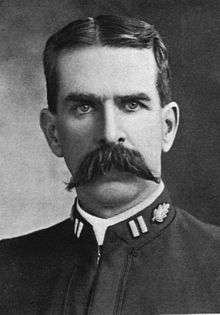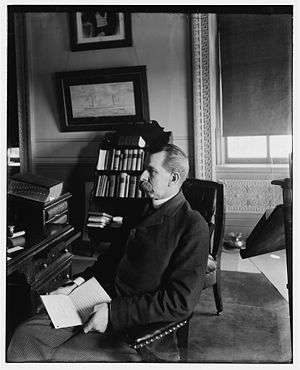Presley Marion Rixey
Rear Admiral Presley Marion Rixey (14 July 1852, Culpeper, Virginia – 17 June 1928) was a Surgeon General of the United States Navy (1902–10) and personal physician to Presidents William McKinley and Theodore Roosevelt.
Presley Marion Rixey | |
|---|---|
 | |
| Born | July 14, 1852 Culpeper, Virginia |
| Died | June 17, 1928 (aged 75) Rosslyn, Virginia |
| Place of burial | |
| Allegiance | |
| Service/ | |
| Years of service | 1874–1910 |
| Rank | Rear Admiral |
Biography

The older brother of John Franklin Rixey,[1] Rixey earned his medical degree at the University of Virginia in 1873. On 25 April 1877, he married Earlena J. English, daughter of Rear Admiral Earl English, United States Navy.
He was commissioned Assistant Surgeon in the Navy on 28 January 1874. He served on the Sabine, Congress, Tallapoosa (1879–82), Lancaster (1884–87), Dolphin (1893–96), and Solace,[2] receiving promotion to Passed Assistant Surgeon on 18 April 1877, to Surgeon on 27 November 1888, and was commissioned as a Medical Inspector on 24 August 1900.[3] He was assigned as the personal physician to First Lady Ida McKinley in 1899 and spearheaded her improved health during the following few years. As he traveled with the McKinleys during this time providing personal care of Mrs. McKinley, he was present when President McKinley was shot in Buffalo. He attended President McKinley after he was shot in Buffalo, New York, in 1901.[4]
Rixey was appointed Surgeon General of the United States Navy on 15 February 1902 and served as Chief of the Bureau of Medicine and Surgery, with the rank of rear admiral, until his retirement on 4 February 1910.[5]
During his tenure as Surgeon General, Rixey strongly supported the foundation of a women's nursing corps for the Navy. In his 1902 annual report, he stated that, "There has been a growing conviction in the minds of many of the most experienced medical officers of the service, especially since the war with Spain, that the employment of women for the nursing of the sick in our large hospitals would result in greater efficiency than has been obtained heretofore by the use of male nurses alone, and that such employment would not conflict with the conditions arising from the military character of the institution." With his help, the Navy Nurse Corps was finally established in 1908.[6]
He accompanied President Theodore Roosevelt during his November 1906 visit to the Panama Canal Zone, and reviewed health and sanitation procedures there.[7]
From 16 January 1913 to 16 April 1917, Rixey served as a member of the Naval Examining Board, presiding over it during the last four months of that period. He died at his home in Rosslyn, Virginia., on 17 June 1928.[5] He is interred in Arlington National Cemetery.
Awards
Rixey received the Spanish Order of Naval Merit from King Alphonso XIII of Spain for assistance he gave to the crew of the replica of the Santa Maria after that vessel suffered an explosion in New York Harbor on May 26, 1893, on its way to the World's Columbian Exposition.[8][9]
Legacy
- Rixey's estate in Arlington, Virginia, became the campus of Marymount University, and his home was renamed Main House.
- The World War II casualty evacuation transport USS Rixey (APH-3) was named for him.
- The Rixey station on the Great Falls and Old Dominion Railroad was built for his estate.
References
- Dr. Presley M. Rixey, President McKinley's Physician, Appointed
- Biographical Sketches of Distinguished Officers of the Army and Navy
- "US Navy Officer: 1775–1900 (R)". history.navy.mil. Retrieved 29 October 2010.
- "DR. RIXEY'S REPORT ON MR. M'KINLEY'S DEATH – Details of the Medical Treatment Given the President". query.nytimes.com. 27 October 1901. Retrieved 29 October 2010.
- "Rixey". Dictionary of American Naval Fighting Ships. Navy Department, Naval History and Heritage Command. 14 October 2005. Retrieved 29 October 2010.
- "U S Navy Nurse Corps Established This Date 1908". ofshipssurgeons.wordpress.com. Retrieved 29 October 2010.
- Special Message of the President Concerning the Panama Canal, December 17, 1906 (pp. 57-59): http://www.theodore-roosevelt.com/images/research/txtspeeches/962.pdf
- Explosion on a Caravel: A Lieutenant and a Sailor Hurt—The Infanta Had Just Gone., The New York Times, May 27, 1893.
- Who's Who in America
Further reading
- Braisted, William C. & Bell, William H. (2004). The Life Story of Presley Marion Rixey, Surgeon General US Navy 1902 to 1910. Kessinger Publishing. ISBN 0-926984-00-4.
External links
- 1905 Biographical Sketch
- Record at Arlington National Cemetery
- Bio at Navy History
- "Guarding the Health of Our Presidents", by Presley Marion Rixey, M.D.
- Presley Marion Rixey on IMDb